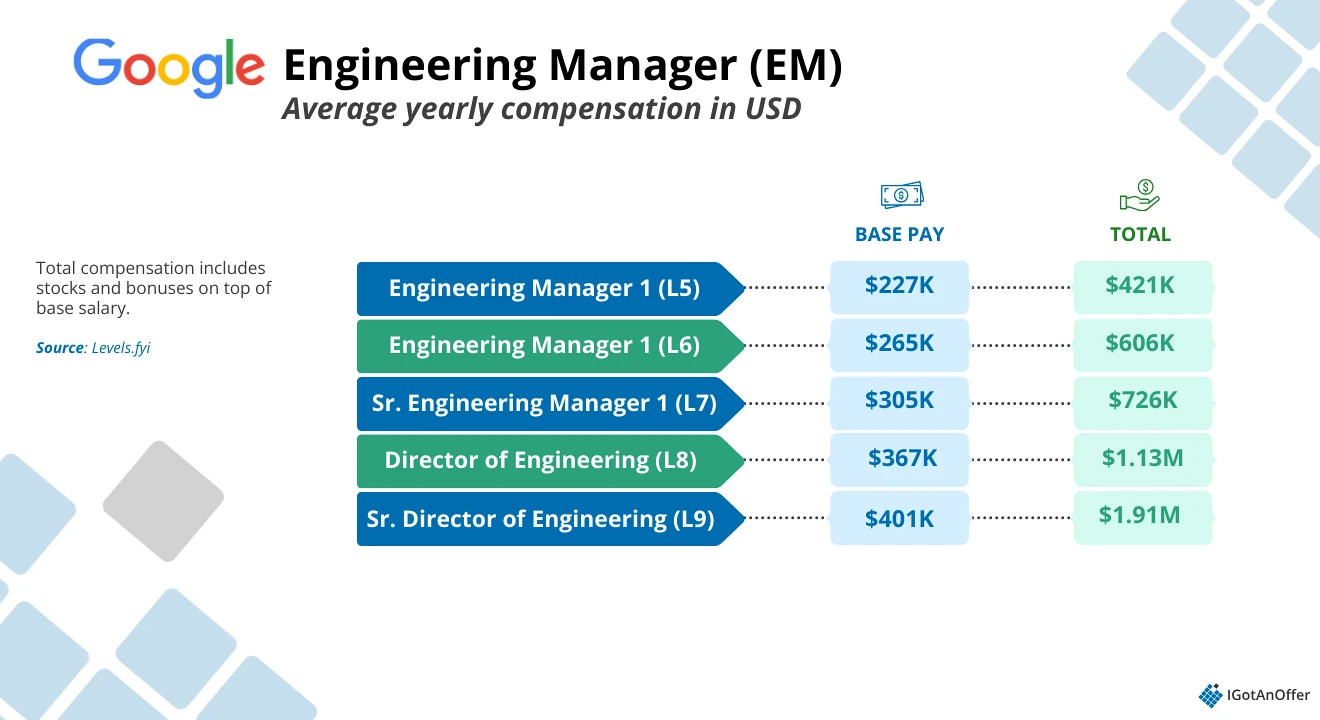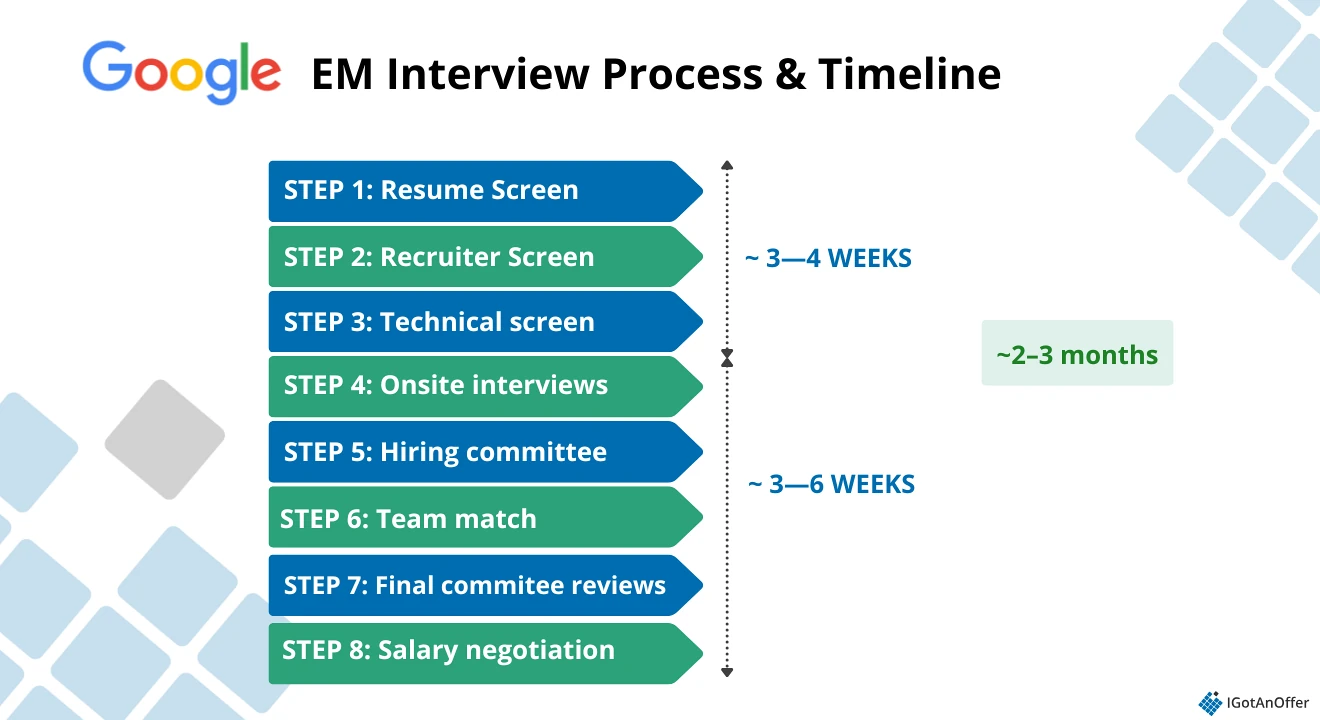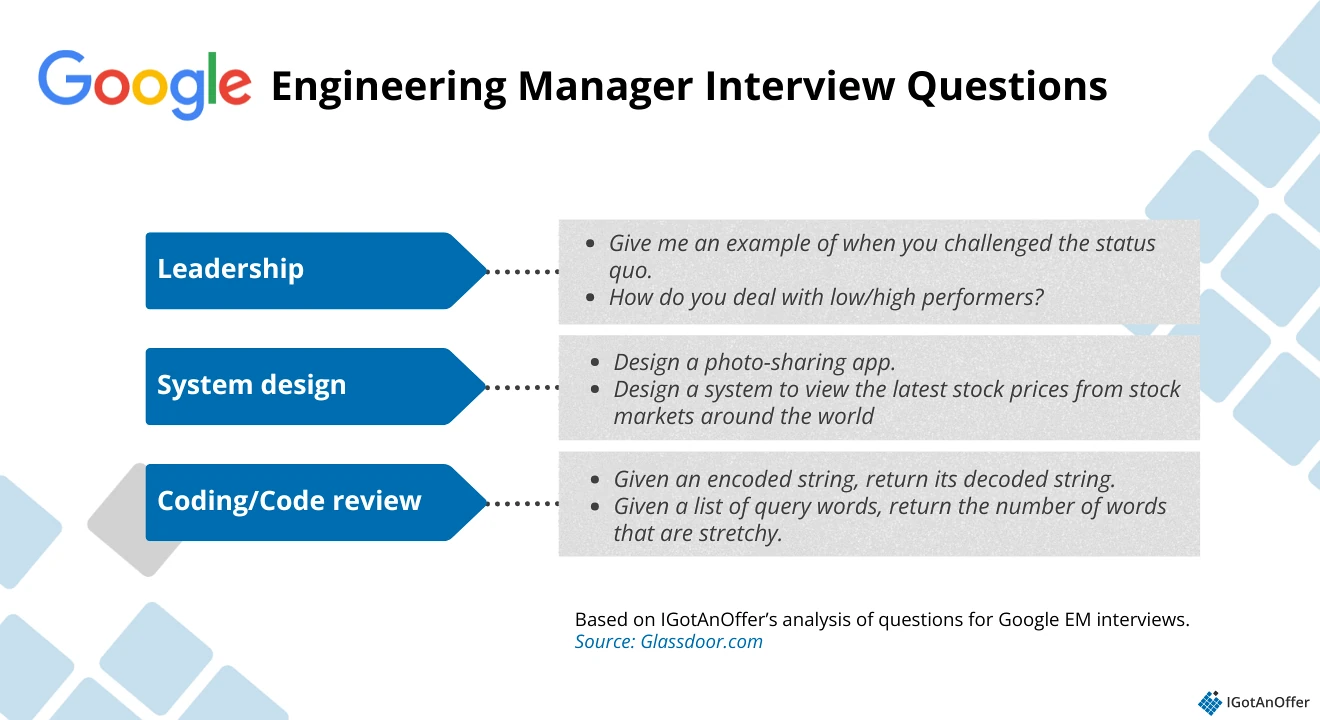In this guide, we’re going to cover everything you need to know to prepare for engineering manager interviews at Google.
We’ve gathered insights from ex-Google EM interviewers on our platform such as Mark, successful candidates we've worked with, hundreds of reports from Google candidates on Glassdoor, as well as information from official Google sources.
Guess what? Google engineering manager interviews aren't easy. Not only will you need to solve tricky coding and system design problems, but arriving at the right solution isn't in itself enough - you need to impress the interviewers with your thought process and show them that you're very comfortable with ambiguity.
In addition, you can expect lots of leadership questions that will probe deep into your management skills and ability to lead.
Here's an overview of what we'll cover:
Ready? Let's get into it.
Click here to practice mock interviews with top engineering manager interview coaches
1. Role and Salary ↑
Before we cover your software engineering manager interviews at Google, let's take a quick look at the role itself (alternatively, feel free to skip straight to the sections on the interview process or interview questions).
1.1 What Does a Google Engineering Manager Do?
1.2 Salary and Compensation
As you’d expect, Google EMs are highly compensated. They make three times as much as the average engineering manager in the US. However, it’s not the highest-paying company. Engineering managers at Meta earn more (Source: Levelsfyi.com.).
Compensation at Google mainly depends on two key factors: location and level.
Location: Salaries are adjusted for cost-of-living. For example, Google EMs in the US make almost 300% more than their counterparts in India.
Level: Both base salary and total compensation go up with each manager level.

To be considered for a senior engineering manager role, you'd usually need around 5+ years of technical leadership experience (whereas you can enter at L6 with 3 years).
To be a director of engineering, you'll need to have worked in engineering for over 15 years and have experience in leading engineering organizations.
And remember, compensation packages are always negotiable, even at Google. So if you do get an offer, don’t be afraid to ask for more. Use this Google offer negotiation guide to help you.
2. Interview process and timeline

What's the Google engineering manager process and timeline? It usually takes between two and three months and follows the steps below. If you're interviewing at Google Cloud Platform, you can expect a similar process.
2.1 What interviews to expect
- Resume screen
- Recruiter screening
- Technical screen
- Onsite interviews
Let's take a closer look at each step in the process.
2.1.1 Resume screen
First, recruiters will look at your resume and assess if your experience matches the open position. This is the most competitive step in the process, as millions of candidates do not make it past this stage.
You can use this free engineering manager resume guide to see successful examples and tailor your resume to the position you’re targeting.
And if you’re looking for expert feedback, you can also get input from our team of ex-Google recruiters, who will cover what achievements to focus on (or ignore), how to fine-tune your bullet points, and more.
2.1.2 Recruiter phone screen
In most cases, you'll start your interview process with Google by talking to a Recruiter on the phone. They are looking to confirm that you've got a chance of getting the job at all, so be prepared to explain your background and why you’re a good fit at Google.
You should expect typical behavioral and resume questions like, "Tell me about yourself", "Why Google?", or "Tell me about your current day-to-day as an Engineering Manager."
Give the recruiter plenty of reasons to put you through to the next round and transmit your enthusiasm for working at Google.
If you get past this first HR screen, the recruiter will then help schedule your technical screening. Your recruiter will usually let you know who you are interviewing with and what type of interviews you should expect and will share resources to help you prepare for them.
2.1.3 Technical screen
The technical screen is a coding interview, testing your knowledge of key data structures and algorithms.
Google sometimes refers to this as a "Technical phone interview" but it usually takes place over Google Meets as you'll be writing code in a Google doc.
This is how Google says you should approach the technical screen:
- Be prepared to write around 20-30 lines of code in your strongest language. Approach all scripting as a coding exercise — this should be clean, rich, robust code.
- You will be asked an open-ended question. Ask clarifying questions, and devise requirements.
- You will be asked to explain it in an algorithm.
- Convert it to a workable code (hint: Don't worry about getting it perfect because time is limited. Write what comes but then refine it later. Also, make sure you consider corner cases and edge cases, production-ready.)
- Optimize the code, follow it with test cases, and find any bugs.
(Source: official Google EM interview PDF)
If, like most of us, you're used to writing code in an IDE that automatically does things like auto-indentation, auto-complete, syntax highlighting, etc., writing syntactically correct code in a Google Doc can be quite uncomfortable. So practice this ahead of the interview!
2.1.4 Onsite interviews
If you pass the first-round interview, you’ve made it to the real test: the “onsite” interviews. You'll typically spend a full day at a Google office and do five or six 45-minute interviews in total, consisting of:
- Leadership interviews (x2)
- System Design interviews (1 or 2)
- Coding & Algorithm interviews (1 or 2)
We’ll dig deeper into these in section three.
If you’re physically onsite, you’ll probably be expected to use a whiteboard to write your code although the company has also started offering Chromebooks for coding interviews at some locations. These laptops come with an interview app that lets you choose the coding language you want to use.
For more information, see our complete guide to Google system design interviews.
Finally, in addition to interviews, you'll also have lunch with a fellow engineer while you are onsite. Lunch is meant to be your time to ask questions about what it's like to work at Google. The company won't be evaluating you during this time, but we recommend that you behave as if they are.
2.2 What exactly is Google looking for?
At the end of each interview, your interviewer will grade your performance using a standardized feedback form that summarizes the attributes Google looks for in a candidate. That form is constantly evolving, but below we have listed the main components we know of at the time of writing this article.
A) Questions asked
In the first section of the form, the interviewer fills in the questions they asked you. These questions are then shared with your future interviewers so you don't get asked the same questions twice.
B) Attribute scoring
Each interviewer will assess you on the four main attributes Google looks for when hiring:
- General cognitive ability. This is often referred to as "GCA" by Googlers. The company wants to hire smart engineers who can learn and adapt to new situations. Here your interviewer will try to understand how you solve hard problems and how you learn. For more information, take a look at our guide to the GCA interview.
- Role-related knowledge and experience. This is often referred to as "RRK" or "RRKE" internally. The company wants to make sure that you have the right experience, domain expertise, and competencies for the position you're applying for. For this role, that means proving you have strong technical acumen. For more information, take a look at our guide to the RRK interview.
- Leadership. Google looks for a particular type of leadership called “emergent leadership.” You'll typically be working in cross-functional teams at Google, and different team members are expected to step up and lead at different times in the lifecycle of a project when their skills are needed. More information in this guide to Google leadership questions.
- Googleyness (i.e. culture fit). The company wants to make sure Google is the right environment for you. Your interviewer will check whether you naturally exhibit the company's values, including: being comfortable with ambiguity, having a bias to action, and having a collaborative nature. More information is in this guide to Googleyness.
Depending on the exact job you're applying for, these attributes might be broken down further. For instance, "Role-related knowledge and experience" could be broken down into "Security architecture" or "Incident response" for a site reliability engineer role. However, the total number of attributes does not usually exceed six or seven.
In this middle section, Google's interviewers typically repeat the questions they asked you, document your answers in detail, and give you a score for each attribute (e.g., "Poor", "Mixed", "Good", "Excellent").
C) Final recommendation
Finally, interviewers will write a summary of your performance and provide an overall recommendation on whether they think Google should be hiring you or not (e.g. "Strong no hire", "No hire", "Leaning no hire", "Leaning hire", "Hire", "Strong hire").
2.3 What happens behind the scenes
If things go well at your onsite interviews, here is what the final steps of the process look like:
- Interviewers submit feedback
- Hiring committee recommendation
- Senior leader and compensation committee review
- Final executive review
- You get an offer
After your onsite, your interviewers will all submit their feedback, usually within two to three days. This feedback will then be reviewed by a hiring committee, along with your resume, internal referrals, and any past work you have submitted. At this stage, the hiring committee will make a recommendation on whether Google should hire you or not.
The hiring committee recommendation will be reviewed and validated by a senior manager and a compensation committee who will decide how much money you are offered. Finally, as you’re interviewing for a senior role, a senior Google executive will review a summary of your candidacy and compensation before the offer is sent to you.
As you've probably gathered by now, Google goes to great lengths to avoid hiring the wrong candidates. This hiring process with multiple levels of validations helps them scale their teams while maintaining a high caliber of employees. But it also means that the typical process can spread over multiple months.
3. Example questions

As we mentioned above, you can expect three types of interviews for an engineering manager role:
- Leadership interviews in which you can expect mainly behavioral questions that assess your past experience and your ability to manage people and projects.
- System design interviews that assess your technical knowledge, your thought process, and your knowledge of architecture and scaling.
- Coding /Code review interviews that assess whether you can write optimized code and help engineers optimize theirs.
In this section, we'll dig deeper into those three types of interviews to give you a clearer idea of what questions to expect, and we'll also provide example questions that you can practice with.
If you need even more practice, take a look at our list of 65 engineering manager interview questions.
Or check out our guide to Google interview questions which includes example answers to the most common questions at Google.
The questions we'll list in the next few sections are real Google EM interview questions that were reported on Glassdoor. We've just categorized the questions, and we've changed the grammar and phrasing in some places to make the questions easier to understand.
Let's jump into the most common type of questions you'll face:
3.1 Leadership interviews
As you're interviewing for a management position, you can expect two leadership interviews during the onsite round. They'll be made up of three types of questions relevant to leadership:
- General behavioral questions (e.g. "Tell me about yourself", "Why Google", etc.). These are to get a sense of your personality and motivations and to see whether you'll fit positively into Google's working culture. They also tend to be asked as an ice-breaker at the beginning of coding and system design interviews.
- People management questions. These tend to dive into how, as a leader, you would support and grow your team. You should expect questions about your approach to developing and retaining team members, your ability to lead teams through difficult situations, and why you think Google is the right culture for you.
- Project management questions. These explore how you would effectively lead projects end-to-end. You should expect questions about project management methodologies, your ability to deal with complex and ambiguous situations, and your experience delivering results.
Questions in a leadership interview can take the form of behavioral questions or hypothetical questions.
What's the difference? Behavioral questions are about how you handled certain circumstances in the past. For instance, "Tell me about a time you led a team through a difficult situation" is a behavioral question. Hypothetical questions are about how you would handle a given situation. For instance, "How would you build a diverse and inclusive team" is a hypothetical question.
For more information, see our guide on how to answer behavioral interview questions as well as our article on the "Why Google?" question.
Now let’s look at some examples.
Example leadership questions asked in Google engineering manager interviews
General
- Why are you an effective R&D leader?
- Tell me about yourself
- Why Google?
- Give me an example of when you challenged the status quo
- Give me an example of when you navigated through a complex/ambiguous situation
- How would you set up a geographically distributed team?
People management
- How do you deal with low/high performers?
- Tell me about a time you handled a conflict
- What's the hardest conversation you've had to have with one of your directs?
- How do you handle people who are not team players?
- How would you deal with unhealthy competition within your team?
- Tell me about a time you developed and retained team members
- How do you set a vision for your team?
Project management
- As a manager, how do you handle trade-offs?
- Describe how you deal with change management
- Describe in detail a project that failed
- Describe a project in the past that was behind schedule and provide concrete steps that you took to remedy the situation
- Tell me how you would balance engineering limitations with customer requirements
- Tell me about a project that had multiple solutions. How did you decide and arrive at the most optimal solution?
- How do you assign team members to a new project? How do you maintain transparency and accountability in this process?
We collaborated with an ex-Google TPM to create guides that will help you prepare for these questions: People management primer for tech interviews and Program management primers for tech interviews (you'll see program management questions are extremely similar to project management).
3.2 System design interviews
Google Search, Gmail, Google Docs, Android, and YouTube all have 1bn+ monthly active users. Google engineering managers therefore need to be able to design systems that are highly scalable and performant.
In system design interviews you'll want to show that you can both be creative and structured at the same time. The questions are typically quite open-ended and it can feel like a conversation. In most cases, your interviewer will adapt the question to your background. For instance, if you've worked on an API product they'll ask you to design an API. But that won't always be the case, so you should be ready to design any type of product or system at a high level.
Here are the most common system design questions asked in Google engineering interviews according to the reports on Glassdoor. For more practice, take a look at our list of 31 system design interview questions.
Example system design questions asked in Google engineering manager interviews
For a deeper dive into this part of your interview, see our specific article: Google system design interview guide. We'd also strongly encourage you to watch the video below - Mark, who was an engineering manager at Google for 13 years, outlines his key principles of system design interviews.
3.3 Coding interviews
Google is the most technical and engineer-led of all the FAANG companies. That's why you'll get a coding interview even though you're applying for a management role.
You may get the choice between a coding interview where you have to actually code to find a solution, or a coding review.
Either way, you'll want to make sure your knowledge of common data structures and algorithms is refreshed and up-to-date.
Below we've listed several Google coding interview questions (unfortunately we don't have any coding review examples). There is more data available for regular (non-management) engineer positions at Google, so the below questions are from Glassdoor data on the Google software engineer interview. We would expect the types of coding questions asked at the engineering manager level to be similar, so these should still be helpful for your preparation.
To make these questions easier to study, we've put them into the following categories, with the most frequent first.
- Graphs / Trees (39% of questions, most frequent)
- Arrays / Strings (26%)
- Dynamic programming (12%)
- Recursion (12%)
- Geometry / Maths (11% of questions, least frequent)
Finally, we recommend reading our guide to Google coding interviews, Google code review interviews, how to answer coding interview questions and practicing with this list of coding interview examples in addition to those listed below.
Example coding questions asked at Google
1. Graphs / Trees (39% of questions, most frequent)
- "Given a binary tree, find the maximum path sum. The path may start and end at any node in the tree." (Solution)
- "Given an encoded string, return its decoded string." (Solution)
- "We can rotate digits by 180 degrees to form new digits. When 0, 1, 6, 8, 9 are rotated 180 degrees, they become 0, 1, 9, 8, 6 respectively. When 2, 3, 4, 5, and 7 are rotated 180 degrees, they become invalid. A confusing number is a number that when rotated 180 degrees becomes a different number with each digit valid.(Note that the rotated number can be greater than the original number.) Given a positive integer
N, return the number of confusing numbers between1andNinclusive." (Solution) - "Given two words (beginWord and endWord), and a dictionary's word list, find the length of shortest transformation sequence from beginWord to endWord, such that: 1) Only one letter can be changed at a time and, 2) Each transformed word must exist in the word list." (Solution)
- "Given a matrix of N rows and M columns. From m[i][j], we can move to m[i+1][j], if m[i+1][j] > m[i][j], or can move to m[i][j+1] if m[i][j+1] > m[i][j]. The task is to print the longest path length if we start from (0, 0)." (Solution)
-
"Given a robot cleaner in a room modeled as a grid. Each cell in the grid can be empty or blocked. The robot cleaner with 4 given APIs can move forward, turn left, or turn right. Each turn it made is 90 degrees. When it tries to move into a blocked cell, its bumper sensor detects the obstacle and it stays on the current cell. Design an algorithm to clean the entire room using only the 4 given APIs shown below." (Solution)
2. Arrays / Strings (26%)
- Implement a SnapshotArray that supports pre-defined interfaces (note: see link for more details). (Solution)
- "In a row of dominoes,
A[i]andB[i]represent the top and bottom halves of thei-th domino. (A domino is a tile with two numbers from 1 to 6 - one on each half of the tile.) We may rotate thei-th domino, so thatA[i]andB[i]swap values. Return the minimum number of rotations so that all the values inAare the same, or all the values inBare the same. If it cannot be done, return-1." (Solution) - "Your friend is typing his
nameinto a keyboard. Sometimes, when typing a character c, the key might get long pressed, and the character will be typed 1 or more times. You examine thetypedcharacters of the keyboard. ReturnTrueif it is possible that it was your friend's name, with some characters (possibly none) being long pressed." (Solution) - "Given a string S and a string T, find the minimum window in S which will contain all the characters in T in complexity O(n)." (Solution)
- "Given a list of query words, return the number of words that are stretchy." Note: see link for more details. (Solution)
- "Given an array of words and a width maxWidth, format the text such that each line has exactly maxWidth characters and is fully (left and right) justified." (Solution)
3. Dynamic Programming (12%)
- "Given a
matrixand atarget, return the number of non-empty submatrices that sum to target." (Solution) - "Given a rows x cols binary matrix filled with 0's and 1's, find the largest rectangle containing only 1's and return its area." (Solution)
- "Your car starts at position 0 and speed +1 on an infinite number line. (Your car can go into negative positions.) Your car drives automatically according to a sequence of instructions A (accelerate) and R (reverse)...Now for some target position, say the length of the shortest sequence of instructions to get there." (Solution)
- "Given strings
SandT, find the minimum (contiguous) substringWofS, so thatTis a subsequence ofW. If there is no such window inSthat covers all characters inT, return the empty string"". If there are multiple such minimum-length windows, return the one with the left-most starting index." (Solution)
4. Recursion (12%)
- "A strobogrammatic number is a number that looks the same when rotated 180 degrees (looked at upside down). Find all strobogrammatic numbers that are of length = n." (Solution)
- "Given a binary tree, find the length of the longest path where each node in the path has the same value. This path may or may not pass through the root. The length of path between two nodes is represented by the number of edges between them." (Solution)
- "Given the
rootnode of a binary search tree, return the sum of values of all nodes with value betweenLandR(inclusive). The binary search tree is guaranteed to have unique values." (Solution)
5. Geometry / Math (11% of questions, least frequent)
- "A group of two or more people wants to meet and minimize the total travel distance. You are given a 2D grid of values 0 or 1, where each 1 marks the home of someone in the group. The distance is calculated using Manhattan Distance, where distance(p1, p2) =
|p2.x - p1.x| + |p2.y - p1.y|." (Solution) - "You are given two non-empty linked lists representing two non-negative integers. The digits are stored in reverse order and each of their nodes contains a single digit. Add the two numbers and return it as a linked list." (Solution)
6. Sorting
- Although we didn't find any in the Glassdoor data, the Google EM guide suggests you may also get a question to test if you're familiar with common sorting functions. It could be something like: "Given the head of a linked list, return the list after sorting it in ascending order".
4. Interviewing Tips ↑
You might be an excellent engineer and a great manager, but unfortunately, that’s not necessarily enough to ace your interviews at Google. Interviewing is a skill in itself that you need to learn.
Let’s look at some key tips to make sure you approach your interviews in the right way.
4.1 Ask clarifying questions
Often, the questions you’ll be asked will be ambiguous, so make sure you ask questions that can help you clarify and understand the problem.
4.2 Think out loud
You need to walk your interviewer through your thought process before you start coding or designing a system. Your interviewer may give you hints about whether you’re on the right track or not.
4.3 State and check assumptions
You need to explicitly state assumptions and check with your interviewer to see if those assumptions are reasonable.
4.4 Get comfortable with ambiguity
More than any other FAANG company, Google will put you in situations that test how comfortable you are with ambiguity. Interviewers will want to talk about your thought process, about the options available to you and the reasons for making different technical choices. Be prepared for a discussion and be open to exploring alternative routes of action.
4.5 Be honest and authentic
Be genuine in your responses. Google interviewers appreciate authenticity and honesty. If you faced challenges or setbacks, discuss how you improved and learned from them.
4.6 Practice system design
Even more than with coding problems, answering system design questions is a skill in itself. You should start with a high-level design and then drill down on the system component of the design. Use our Google system design interview guide to prepare.
4.7 Brute force, then iterate.
When coding, don’t necessarily go for the perfect solution straight away. Google recommends that you first try and find a solution that works as quickly as you can, then iterate to refine your answer.
4.8 Get comfortable with coding on various mediums
Google now typically asks interviewees to code in a Google doc. But this can vary, it could be on a physical whiteboard or a virtual one. Check with your recruiter what it will be and practice it a lot.
The key is to keep your code organized so your interviewer won’t have difficulty understanding what you’ve written.
4.9 Understand system design expectations
Your system design interviewers will have different expectations of you depending on your seniority.
If you're a junior engineer, you can focus mainly on satisfying the functional requirements, and you can expect to get some hints and guidance from the interviewer on certain decisions. Furthermore, you're not expected to get everything right.
That changes if you're a senior engineer. You'd be expected to demonstrate awareness of a range of non-functional requirements and create a working design that responds to them.
And while a junior might be able to ask 'What are the most important requirements?', a senior engineer needs to make that decision for themself and then clarify with the interviewer, "Do these requirements match what you're expecting?'
4.10 Center on Google’s values
Familiarize yourself with Google’s core values and align your behavioral responses with them. Google values certain attributes such as passion for technology, collaboration, and focus on the user.
5. How to prepare
Now that you know what questions to expect, let's focus on how to prepare.
We've coached more than 15,000 people for interviews since 2018. Below is our four-step prep plan for Google or GCP. If you're preparing for more companies than just Google, then check our non-company-specific engineering manager preparation guide.
5.1 Learn about Google's culture
Most candidates fail to do this. But before investing tens of hours preparing for an interview at Google, you should take some time to make sure it's the right company for you.
Google is prestigious and it's therefore tempting to assume that you should apply, without considering things more carefully. But, it's important to remember that the prestige of a job (by itself) won't make you happy in your day-to-day work. It's the type of work and the people you work with that will.
If you know any engineers who work at Google (or used to), then it's a good idea to talk to them to understand what the culture is like. In addition, we would recommend reading the following resources:
-
Google's mission statement (by Google)
-
Google's values (by Google)
-
Google strategy teardown (by CBS Insights)
-
EM interview guide (by Google Careers)
5.2 Practice by yourself
As discussed above, you'll have to answer three types of questions at Google: leadership (behavioral), system design, and coding. The first step of your preparation should be to brush up on these different types of questions and to practice answering them by yourself.
For leadership or people management questions, we recommend learning our step-by-step method for answering behavioral questions. In addition, you'll want to write down your answers to the common leadership questions we have listed in the previous section.
For a really insightful deep dive, you should then read Mark's "Grokking the engineering management leadership interview' post. Finally, consult our program/project management primer as well for insight into project management skills.
For system design questions, we recommend studying our system design interview questions and prep guide. These guides cover a step-by-step method for answering system design questions, and they provide example questions with solutions.
For coding interviews, we recommend getting used to the step-by-step approach hinted at by Google in the video below.
Here's a summary of the approach:
-
Ask clarification questions to make sure you understand the problem correctly
-
Discuss any assumptions you're making
-
Analyze various solutions and trade-offs before starting to code
-
Plan and implement your solution
-
Test your solution, including corner and edge cases
To practice solving coding questions we recommend working through our list of questions in section 3.3 above, as well as using our articles, 73 data structure questions, and 71 algorithms questions, which have links to high-quality answers to each problem. They are organized by type of data structure or algorithm as well as by difficulty level. Don't forget to practice on a whiteboard or Google Doc instead of in an editor.
If you choose the code review for your technical round, check out our comprehensive Google code review interview guide to help you with your prep.
Interviewing for an EM role at another company? You may also want to check out our other company-specific EM interview guides:
- Microsoft engineering manager interview guide
- Apple engineering manager interview guide
- Meta engineering manager interview guide
- Netflix engineering manager interview guide
- DoorDash engineering manager interview guide
- Uber engineering manager interview guide
Finally, a great way to improve your communication for leadership, system design, and coding questions is to interview yourself out loud. This may sound strange, but it can significantly improve the way you communicate your answers during an interview. Play the role of both the candidate and the interviewer, asking questions and answering them out loud.
However, by yourself, you can’t simulate thinking on your feet or the pressure of performing in front of a stranger. Plus, there are no unexpected follow-up questions and no feedback.
That’s why many candidates try to practice with friends or peers.
5.3 Practice with peers
If you have friends or peers who can do mock interviews with you, that's an option worth trying. It’s free, but be warned, you may come up against the following problems:
- It’s hard to know if the feedback you get is accurate
- They’re unlikely to have insider knowledge of interviews at your target company
- On peer platforms, people often waste your time by not showing up
For those reasons, many candidates skip peer mock interviews and go straight to mock interviews with an expert.
5.4 Practice with experienced engineering manager interviewers
In our experience, practicing real interviews with experts who can give you company-specific feedback makes a huge difference.
Find a Google engineering manager interview coach so you can:
- Test yourself under real interview conditions
- Get accurate feedback from a real expert
- Build your confidence
- Get company-specific insights
- Learn how to tell the right stories, better.
- Save time by focusing your preparation
Landing a job at a big tech company often results in a $50,000 per year or more increase in total compensation. In our experience, three or four coaching sessions worth ~$500 make a significant difference in your ability to land the job. That’s an ROI of 100x!
FAQs
How does team matching work at Google?
If you pass the interviews and land an offer, the team matching process begins. Your recruiter will schedule you interviews to meet with members of a few different teams. This is a chance for you to ask questions to each team and decide which one you most want to work in.
Of course, it works both ways. You need to find a team that wants to hire you, and depending on the time of year, headcount restrictions, and the region you want to work in, this process can stretch on for months. For this reason, Google has started to try and integrate team-matching interviews earlier on in the interview process. So you might have an interview with a potential team hiring manager in your first-round or onsite interviews.
Team matching can be a bit opaque and frustrating when you're so close to starting at Google, but it's your recruiter's job to shed light on how it works and keep you updated, so don't be afraid to ask them.















